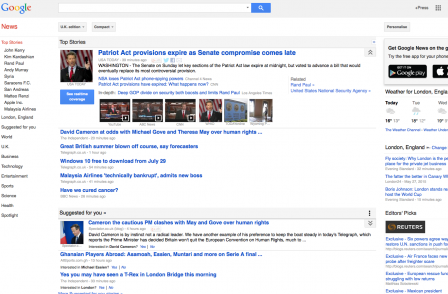
David Benigson is chief executive of media monitoring company Signal
Like most big tech firms, Google doesn’t do “sorry”, but the announcement of its Digital News Initiative is a tacit acknowledgment that they've been profiting from online news links for years without giving anything back. Yet this doesn’t resolve the issue that Google – along with companies like mine – aren’t paying for the news content on which their revenue depends.
The debate about fair remuneration for use of copyright material dates back to the dawn of the web, but it boiled over in 2011 when the Newspaper Licensing Agency (NLA) introduced new licences for online copying. Media research company Meltwater, backed by the Public Relations Consultants Association (PRCA), took the NLA through the British and European courts, a journey that only ended last summer with a ruling that media monitors and their clients should pay publishers when they use their content for commercial reasons.
But this doesn’t cover search engines that profit from the ads shown alongside news searches, such as Google, or those that aggregate data from online articles, like Signal. Industries such as search and analytics base their business model, in part or entirely, on online news content. While many of these organisations undoubtedly appreciate the free ride, I believe we have a moral duty to pay for the content on which our businesses depend.
Unfortunately, the present licensing regime makes it incredibly difficult, if not impossible for us to remunerate publishers. At present, the NLA licensing structure focuses on copies of copyright material, and it works well enough for this purpose. But where there is no copying involved – for example, when companies provide links to articles or analysis of aggregated news content – there is no way to make micropayments to publishers for the news stories that are being used.
It’s time that the NLA updated its licensing structure to enable news publishers to get a cut of the profits that other firms are making on their content. It would do well to look at the example provided by the software-as-a-service industry over the last decade, which has thrived because it has operated simple, upfront pricing, clear to end users. We want to pay publishers more every year, but the current system risks reducing, not growing, their revenue.
Other media do not have this problem. In fact, when you think about music or movie aggregation platforms, those industries have got their house in order by overhauling and embracing wider access and a new royalty regime.
When they committed their content to platforms like Spotify, music labels knew that they would get a small fee every time a track is played anywhere in the world. Media futurist Gerd Leonhard calls this “music like water” – on-tap content whose every click generates a payment for its originators. This caused licensing revenue from online sources to double between 2008 and 2012 in the UK alone, surpassing even money paid from radio income, according to PRS For Music. Arguably, it could save the whole industry.
Similarly, TV and movie studios are benefitting from having developed a more relaxed attitude to subscription access, through services like Netflix and their own branded players, beyond merely outright ownership.
The news business deserves the same kind of renaissance being enjoyed by its sibling sectors. Publishers should adopt a “News Everywhere” or “News Like Water” approach to re-use of their content, incurring a small fee every time.
But, today, their system depends too much on a revenue-at-all-costs approach first developed two decades ago and which constricts the possible market opportunity.
Newspapers have historically enjoyed only two core revenue streams – advertising and consumer sales. Just as record labels have, I would dearly love to see them adopt a growing third – business-to-business licensing. Everyone stands to benefit, if only we can reform the system now.
Email pged@pressgazette.co.uk to point out mistakes, provide story tips or send in a letter for publication on our "Letters Page" blog
